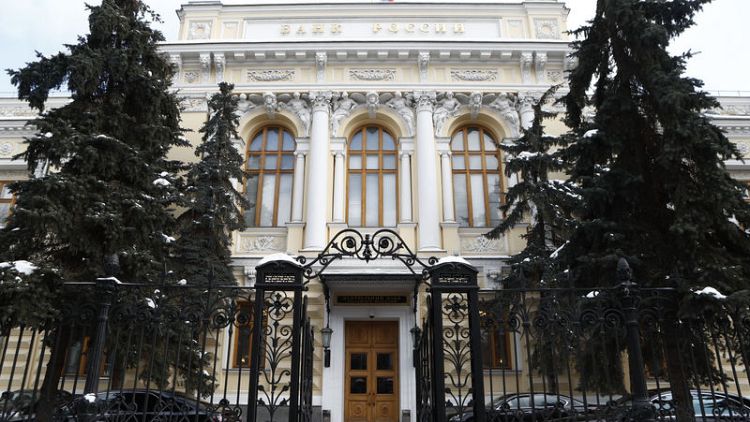By Andrey Ostroukh and Elena Fabrichnaya
MOSCOW (Reuters) - The Russian central bank is expected to keep interest rates unchanged on Friday, indicating it may consider cutting rates later this year, a Reuters poll showed on Monday.
The 21 analysts and economists who took part in the poll on April 22 unanimously predicted that the central bank will hold the key rate at 7.75 percent at the upcoming rate-setting meeting.
After raising rates twice last year to rein in rising inflation, the central bank held them unchanged on March and said it could lower the cost of lending later in 2019 if inflation eases in line with expectations and no major oil market shocks occur.
"We understand that an interim meeting in April will hardly be a game-changer in terms of a bold change in inflation projections and, therefore, policy guidance," said analysts at Rosbank, a subsidiary of Societe Generale.
"Nevertheless, we expect the easing tone to strengthen, as short-term and structural inflation risks are played down further," Rosbank said.
Governor Elvira Nabiullina, presenting the rate decision in March, said the steps the central bank had already taken seemed enough to slow inflation towards the 4 percent target as soon as next year.
The rate decision this week will not be accompanied by Nabiullina's media conference and thus is considered by the market to be an interim one where the probability of a rate change is lower than at those that are followed by the conference.
Inflation, the central bank's main remit, has already approached its peak of around 5.3 percent this year, boosted by a tax hike and a weaker rouble, and is widely expected to slow from now on.
The slowdown, however, could be not enough for the central bank to lower its rates at the next meeting, said Denis Popov, an analyst at Promsvyazbank.
"High risks - geopolitical and inflationary - will for now keep it from this move," Popov said, adding that he saw the key rate staying unchanged throughout this year. The probability of a rate cut at some point this year, however, was on the rise, he said.
(Reporting by Andrey Ostroukh and Elena Fabrichnaya; Editing by Frances Kerry)



